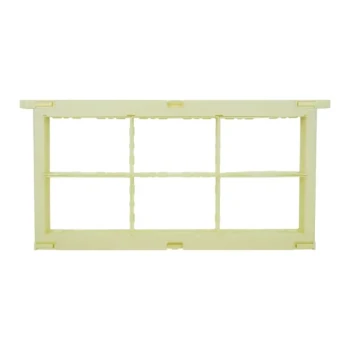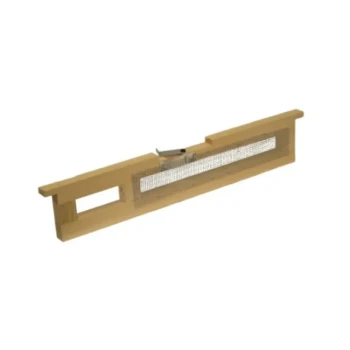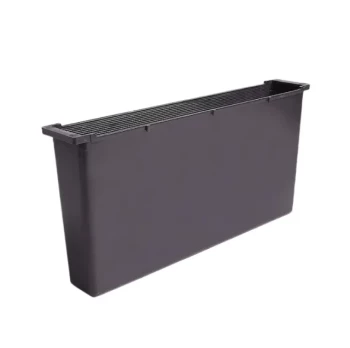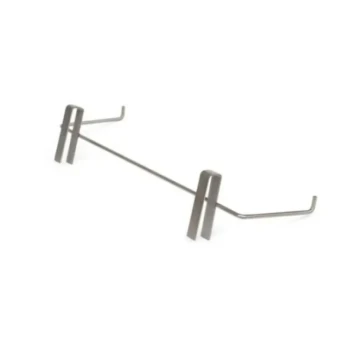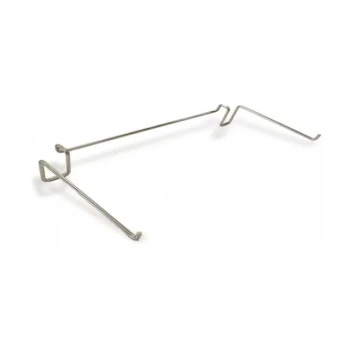Storing honey-laden frames is a key strategic practice in beekeeping. Its primary benefit is providing a perfect, ready-to-use food source that can be given to weaker colonies in the early spring, significantly boosting their chances of survival and accelerating their population growth.
The true value of storing honey frames is not just in the honey itself, but in its strategic use as a management tool. It allows a beekeeper to transform a simple surplus into a powerful asset for ensuring colony health and equalizing the strength of an entire apiary.
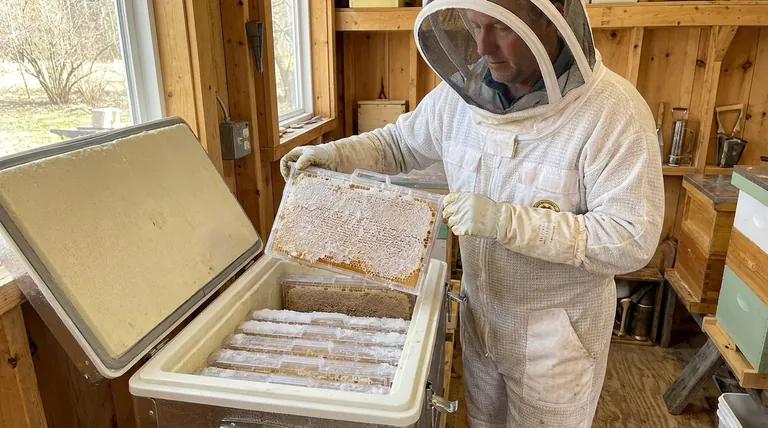
The Strategic Value of Stored Honey Frames
A full frame of capped honey is more than just food; it's a perfectly preserved energy and nutrition reserve that you can deploy with precision.
A Natural 'Superfood' for Spring Buildup
Honey is the ideal food for bees. It contains the precise blend of sugars, enzymes, and trace nutrients that bees need to thrive and raise brood.
While sugar syrup is a common supplement, it is an artificial substitute. A frame of natural honey provides a far superior nutritional boost to a colony struggling to build up in the spring.
Jump-Starting Weaker Colonies
A colony emerging from winter may be small, with a limited number of foragers. If early spring weather is poor, they can quickly consume their remaining stores and face starvation.
Providing a full frame of honey gives this colony immediate access to high-density energy. This allows them to dedicate their efforts to critical tasks like caring for the queen and raising new brood, rather than risky foraging flights in cold weather.
Insurance Against Poor Weather
Early spring is often a volatile period of cold snaps, rain, and wind. These conditions can confine bees to the hive for days at a time, cutting them off from the first nectar flows.
Having stored honey frames acts as a crucial insurance policy. It guarantees your colonies can weather these unpredictable periods without a catastrophic loss of population.
Understanding the Trade-offs and Risks
Storing honey frames is a powerful technique, but it is not without risks that must be managed properly.
The Primary Risk: Wax Moths
Wax moths are a destructive pest whose larvae tunnel through and consume beeswax comb, destroying it in the process. They are especially attracted to frames that have contained brood, but will also infest pure honeycombs.
If frames are not stored in a moth-proof environment, they can be completely ruined over the winter, resulting in a total loss of both the comb and the honey.
The Problem of Robbing
Introducing a frame of honey into a very weak hive can trigger "robbing" behavior from nearby stronger colonies. The scent of open honey can attract thousands of bees from other hives, who may overwhelm and kill the weak colony to steal its resources.
This risk must be managed by using entrance reducers on the weak hive and ensuring there are no other open honey sources nearby.
Storage Space and Effort
Practically speaking, storing frames requires effort and dedicated space. The frames must be kept in a secure, dry, and cool location that is inaccessible to pests like mice and wax moths.
This requires more work than simply extracting all the honey in the fall and storing it in jars.
Best Practices for Storage and Use
Properly storing and deploying your honey frames is critical to their success.
Ensuring a Moth-Proof Environment
Store frames in sealed containers, such as large plastic totes with tight-fitting lids. Some beekeepers also use dedicated, well-sealed cabinets or freezers.
Commercially available products, such as Para-Moth (paradichlorobenzene), can be used to protect stored combs, but require careful handling and proper ventilation of the frames before they are returned to a hive.
The Freeze-Thaw Cycle
A highly effective, chemical-free method is to freeze the frames. Place the honey frames in a chest freezer for at least 48 hours.
This kills any existing wax moth eggs and larvae. After freezing, the frames can be safely stored in sealed containers at room temperature.
When to Provide the Frame
The ideal time to give a frame of honey is in late winter or early spring, just as the queen begins to expand her laying and the colony's food needs are increasing.
Place the frame at the edge of the existing brood nest, allowing the bees to easily access it as the cluster expands.
Making the Right Choice for Your Apiary
How you use stored honey depends entirely on your beekeeping goals.
- If your primary focus is colony survival: Storing at least one or two "emergency" honey frames for each hive is a non-negotiable insurance policy against starvation.
- If you manage multiple hives of varying strength: Storing honey frames is the best way to equalize your apiary by giving weaker hives the resources they need to catch up.
- If your primary focus is maximizing honey yield: You may choose to extract more honey, but the security provided by even a single stored frame per colony often outweighs the small loss in immediate yield.
Ultimately, viewing stored honey as a strategic management tool—not just a harvestable product—is a mark of an experienced and proactive beekeeper.
Summary Table:
| Benefit | Key Takeaway |
|---|---|
| Spring Nutrition | Provides a superior, natural 'superfood' for brood rearing vs. artificial sugar syrup. |
| Colony Strength | Jump-starts weaker colonies, allowing them to focus on brood care instead of foraging. |
| Weather Insurance | Acts as a crucial food reserve during unpredictable early spring cold snaps and rain. |
| Apiary Management | Enables beekeepers to equalize hive strength across their entire operation. |
Ready to strengthen your apiary's resilience and boost spring survival rates?
At HONESTBEE, we supply commercial apiaries and beekeeping equipment distributors with the durable, high-quality supplies needed to successfully implement strategic practices like storing honey-laden frames. From robust storage containers to essential hive management tools, our wholesale-focused operations ensure you have the reliable equipment to protect your valuable assets.
Contact our expert team today to discuss your specific needs and discover how our products can help you build a stronger, more productive beekeeping operation.
Visual Guide
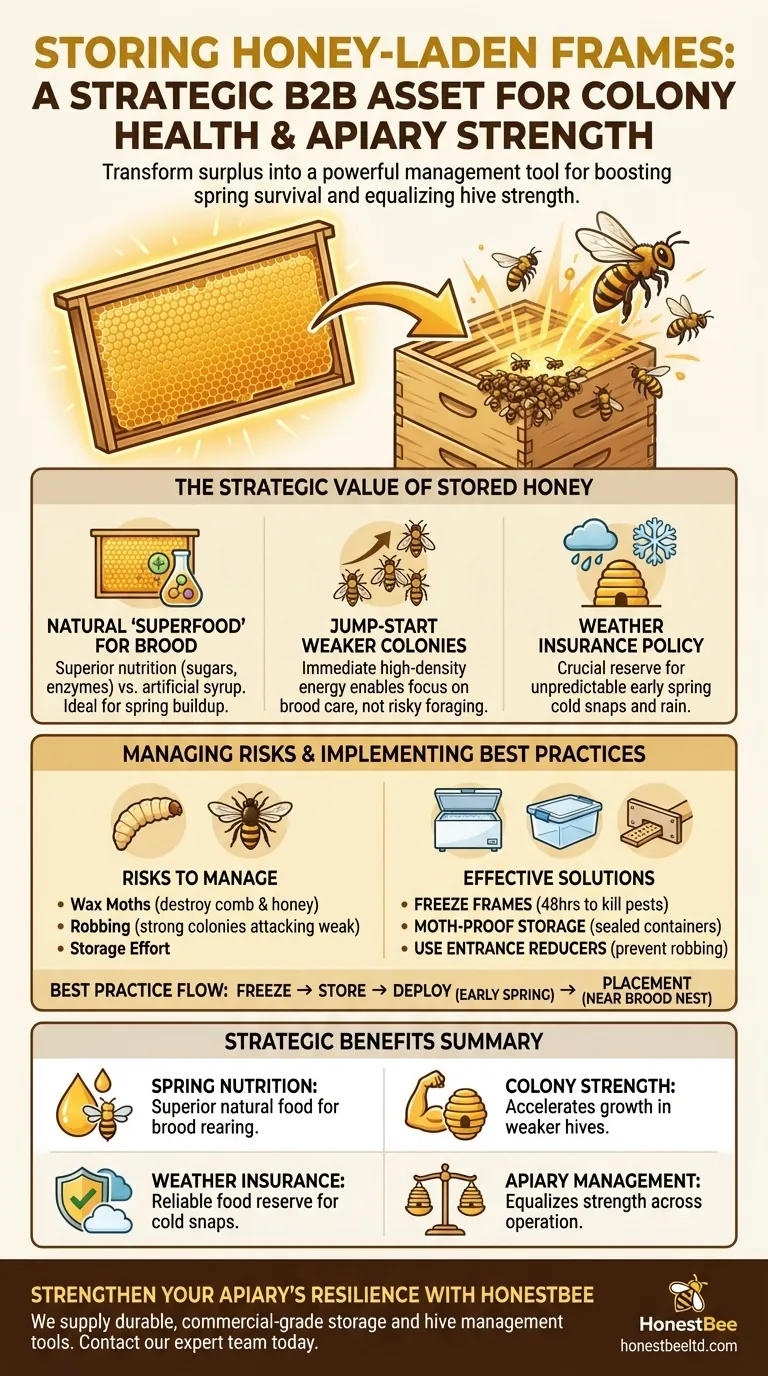
Related Products
- Heart-Shaped Comb Honey Frame and Honeycomb Cassette
- Plastic Honey Comb Frames Cassette Box for Honey
- Professional 500g Sectional Comb Honey Frame System for Beekeeping
- Plastic Bee Frame Beekeeping Hive Frames for Wholesale
- Assembled Wooden Bee Frames with Beeswax Foundation Ready to Use by HONESTBEE
People Also Ask
- What are honey super frames and what foundation options are available? Choose the Best Support for Your Bees
- What is the purpose of using a Gridded Wooden Frame? Unlock Precise Data for Brood and Honey Measurement
- What frame to use for honeycomb? Choose the Right System for Pure, Edible Comb
- How are standard honey bee frames used as a measurement tool? Quantify Colony Strength with Precision
- How much honey from a full frame? Maximize Your Harvest with the Right Frame Size


